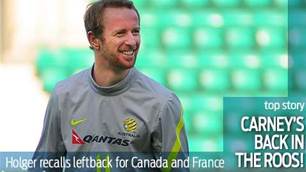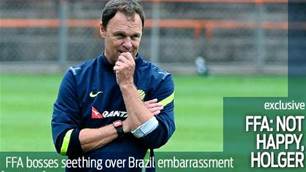Why stereotypes and clichés in football are often simplistic and agenda-driven.
IF you want to be a journalist, you cannot read enough Harold Evans. The editor of the UK’s The Sunday Times from 1967 to 1981, Evans inked what became a bible for aspiring journalists back in 1972, Essential English for Journalists, Editors and Writers. I tend to re-read the book every few years to remind me of Evans’ genius. Evans was also famous for saying: “Attempting to get at truth means rejecting stereotypes and clichés.”
Football is, rather sadly, still rife with stereotypes and clichés. However, it is additionally disconcerting that a current debate prevalent in Australian football is that a British coach will inevitably produce long-ball football. It is a stereotype no more intelligible than those knuckle-dragging ignorant racists who claim that black players are all lazy or that Jewish owners will be tight with the club’s purse strings. However, heated debate over whether it is racist to claim that all British managers are merchants of the long-ball diverts from what that point in this case indubitably is – simplistic and agenda-driven.
Before forming an opinion on UEFA Pro Licence holder and interim Melbourne Victory coach Jim Magilton, countryman of Swansea coach Brendan Rodgers who has taken the EPL by storm with his attractive passing style, I did what is known as research, something I learned extensively about while studying journalism at University for several years, then in my full-time career thereafter.
Here is what Liz Edwards, chairperson of the official Ipswich Town Supporters Club, told me this week about the Magilton era: “As a manager, Jim always wanted Town to play proper football. At times, long-ball might have given better results, but he was always insistent that we keep the ball on the ground, pass it through the opposition, and demonstrate that we were a footballing side. He left Town, ignominiously sacked for failing to get us into the top six, though since then - and despite later managers being given considerably greater budgets - we have struggled even to achieve mid-table mediocrity.”
I also spent this morning with Socceroos manager Holger Osieck. The German with 35 years of top-level coaching experience had this to say about the debate: “On my passport it says that I am German, but I consider myself an international coach. If you have a certain cliché of a German coach, then I definitely don’t fit into it. Therefore, it is not a black and white issue. The truth is often in the middle. It is not a matter of the passport you are holding, it is a matter of how you approach the game, how you deal with it and what are your ideas towards the game. I am a foreigner myself in this country and I think when you look over the fence and bring in people from outside, that can only be enriching for the domestic scene.”
One of the most enriching influences on the game in Australia today is FFA coach educator Kelly Cross. If you are unaware of Cross and his approaches, let me assure you that he is one of the sharpest and most progressive minds in coaching. It is a privilege that he works within the Australian system. Cross, like the recently departed and hugely talented former Adelaide United assistant Phil Stubbins, also happens to be British-born.
This debate often reminds me of 39 Days of Gazza, a book written by a local journalist in the UK, Steve Pitts, about Paul Gascoigne’s tragicomic reign as manager of non-league Kettering Town. When one of the Kettering players charted the nadir of Gazza’s short tenure, he recalled when the team of modestly talented players were sat down in front of footage of France 98 and told to play like Zinedine Zidane in the next match. Gazza was a mentally-ill alcoholic and that strikes me as the only salient excuse for thinking that all players, regardless of talent, should play football in a singular elitist manner. One of my favourite aspects of football is that it involves a clash of differing cultures, styles and approaches – we should advocate the removal of such diversity at our peril.
Dogmatism is an ugly trait. It is also dangerous to believe that your opinion is more important than the facts. As St.Thomas Aquinas said: “Beware the man of one book”. And most certainly beware of the person of one opinion. We should also never let personal bias dictate a position of potential influence. Regardless of if that involves indirectly campaigning, via the national media, for our brother to get a job at the AIS, for example.
I’ll close by quoting another journalistic hero of mine, who sadly lost his battle with cancer in December, Christopher Hitchens: “Take the risk of thinking for yourself, much more happiness, truth, beauty, and wisdom will come to you that way.” Remember that – don’t swallow everything you read whole, as it’s likely you’ll just end up choking on another’s personal agenda.
Related Articles

Holger's second chance Roos

Milligan backs Osieck to remain Australia's coach













